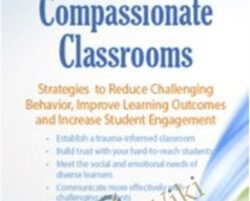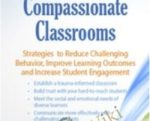As an educator, you are faced with the challenge of meeting the social and emotional needs of all your students. This can be challenging enough with typical learners but it is even more difficult with those who have experienced trauma or have mental health challenges. Students who have experienced trauma often present as difficult to engage and display problematic behavior such as a low frustration tolerance, angry outbursts or difficult social relationships. These behaviors all get in the way of teaching and learning. When a student has experienced trauma, he/she often spends much of the day in fight/flight/freeze mode which limits their capacity to learn. Their outwardly aggressive and irritable behaviors also disrupt the flow in the classroom, requiring your time and attention. Despite the amount of time you invest in behavior charts or incentives for good behavior, traditional behavioral approaches to classroom management and a punitive approach to discipline simply are not effective.Watch Dr. Bashant and learn how a trauma-informed approach will greatly reduce challenging behavior, improve student engagement and increase learning outcomes. Finish this recording with new strategies, tools and resources to reduce students’ impulsiveness, aggressive behaviors and inattention and increase their focus, attention and compassion. While this positive approach is absolutely essential for students with trauma, it will also greatly benefit each and every student in your classroom. Return to your school with:Research-based practices to establish a trauma-informed classroomA plan to develop positive relationships and build trust with your hard-to-reach studentsProve techniques for communicating more effectively and collaboratively with challenging studentsCognitive skill-building strategies which incorporate the science of neuroplasticity and the strengths-based perspective of neurodiversityAnalyze the ways in which poverty and mental health contribute to trauma responses thus informing your approach to working with all students.Determine how trauma impacts a child’s development and develop strategies for meeting his or her needs.Explore how exposure to adverse childhood experiences determines the likelihood of developmental trauma and its impact on level of functioning across the lifespan.Establish a collaborative approach to discipline and demonstrate how this fosters intrinsic motivation for behavior change in the child.Practice techniques to establish positive relationships and build trust with hard-to-reach students thus increasing their social and academic success.Explore mindfulness activities that foster student self-awareness, self-regulation and the ability to focus as it relates to impulsive behavior and attention.Trauma in Students: What to Look ForFight, flight or freeze responses: How it manifests in schoolWired for fear: Impact on the whole childACEs – Adverse Childhood Experiences study and surveyThe role of poverty and mental health challengesTrauma TherapyBenefitsLimitations of the ResearchPotential RisksDiscipline in a Trauma-Informed ClassroomChanging your mindset: Punitive vs. collaborativeStrategies to foster intrinsic motivation3 steps to implement a collaborative approachCase study: How you respondNeuroplasticity: Activities to Establish & Strengthen Neural PathwaysStrategies to develop new ways of respondingSlow down, stop and thinkRespond rather than reactSocial storiesTechniques to incorporate the 4 R’s:RhythmicRepetitiveRelationalRewardingRelationships as a Protective FactorTechniques to form positive relationships and increase students’ likeliness to:Stay in school longerWork harderIncrease test scores & gradesIncrease their self-confidenceTechniques to help students feel connected to school making them less likely to:Smoke or drinkHave sexual intercourseDevelop emotional problemsExperience suicidal thoughts or attemptsCarry weaponsBe involved in violence or dangerous activitiesCase study: Strengths-based, solution-focused approachMindfulness and Self-Awareness Activities To:Help with transitionsReduce impulsive behaviorsStrengthen empathy, kindness and compassionCalm and focus attentionSocial and Emotional Learning Techniques to Increase:Focus and concentrationImpulse controlConflict resolution skillsMindful Communication Tools to Improve Student EngagementLead with presenceAttentionIntentionMindful Strategies to Increase Connection, Empathy & CommunityGratitudeHeartfulnessZones of Regulation to Teach Self-Awareness & Emotional ControlRed zoneYellow zoneGreen zoneBlue zoneTag: Trauma Informed Compassionate Classrooms: Strategies to Reduce Challenging Behavior, Improve Learning Outcomes and Increase Student Engagement – Jennifer L. Bashant Review. Trauma Informed Compassionate Classrooms: Strategies to Reduce Challenging Behavior, Improve Learning Outcomes and Increase Student Engagement – Jennifer L. Bashant download. Trauma Informed Compassionate Classrooms: Strategies to Reduce Challenging Behavior, Improve Learning Outcomes and Increase Student Engagement – Jennifer L. Bashant discount.
 Course Builder’s Laboratory – Danny Iny
₹27,058.00
Course Builder’s Laboratory – Danny Iny
₹27,058.00
 GMMA Trend Volatility Management (Video 1.42 GB) – Dary Guppy
₹4,150.00
GMMA Trend Volatility Management (Video 1.42 GB) – Dary Guppy
₹4,150.00
Trauma Informed Compassionate Classrooms: Strategies to Reduce Challenging Behavior, Improve Learning Outcomes and Increase Student Engagement – Jennifer L. Bashant
₹12,450.00






